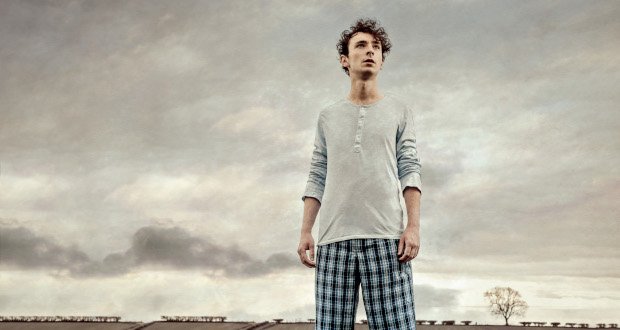Inspired by the true of story of ten Irish workers who lost their lives due to a fire in a Scottish bothy in 1937, this new production from Theatre Gu Leòr is a sensitive celebration of the human spirit. Focusing on schoolboy Michael trying to complete a local history project in amongst his arguing family, things take a turn for the bizarre when he finds himself transported to the past observing the tragedy first-hand. Seemingly invisible to all except the young Molly, is Michael in a “mad dream” of his own?
Duality is very much the theme there: two countries and cultures, two time periods, two sets of ‘families’, actors doubling up roles, two voices reading the roll call of the dead… It transpires Molly has two identities and even a photograph is torn cleanly in two at one point. Perhaps the most striking example of duality concerns language: Michael talks to Molly in English, whilst she answers back in Gaelic. This fortunately never veers into clunky, Lassie-esque exchanges of “what’s that? You think I’m wearing strange clothes?” – mainly due to the fact this approach is never overused due to careful structuring. Indeed, at times there are musical intervals in Gaelic and dialogue form others that is not in English: not knowing the words does nothing to diminish the intended meaning. This is a powerful, almost lyrical, approach to the use of dialogue and it works beautifully.
Less successful is the at times didactic tone; viewing the 1937 tragedy through the prism of 21st-century concerns over migrant workers and asylum seekers at times does result in some forced topicality (notably around the tragic story of Alan Kurdi). Also, the revelations about Michael’s own family history binding so closely to the historical tragedy felt somewhat twee. As this is the strand which brings the production to a close, it feels like a slightly weak point on which to end.
Marked by simple yet effective lighting contrasts, time periods shimmer and blur to become almost interchangeable – in a way which is simple yet strikingly effective. This is most notably handled when the carrying of a coffin provides a seamless transition into the here and now: death is the one constant we all face. As Michael, ‘buried’ on stage literally and metaphorically under a layer of history, Ryan Hunter is engaging and displays excellent comic timing when throwing himself around on stage. He may be invisible, but benches are still lifted from under him. Faoileann Cunningham as Molly narrowly steals the show, however, switching expertly between states of frivolity, flirtation, frustration and despondency.
At 90 minutes straight through, Scotties never drags or becomes inaccessible. Whilst good indeed it frustratingly doesn’t quite reach the heights of excellence. The drama is slightly too clichéd in the end to allow this, with the scenes set in the present not proving as compelling or magical as those set in a dream-like 1937. The general theme of prejudice and inability to understand our human propensity towards dislike for unlike may seem naively conveyed but Scotties‘ heart is in the right place.
